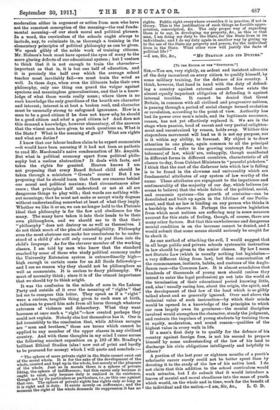[To THE EDITOR OF THE " EPECTATOR."3 SiR,—Yon are, very
rightly, an ardent and insistent advocate of the duty incumbent on every citizen to qualify himself, by some military training, for the defence of his country. I think, however, that hand in hand with the duty of defend- ing a country against external assault there exists the almost equally important obligation of defending it against internal troubles. It cannot be denied that Great Britain, in common with all civilized and progressive nations, is passing through a period of social change termed evolution or revolution, according to the point of view. Authority has lost its power over men's minds, and its legitimate successor, reason, has not yet effectively replaced it. We are in the stage when passion, bred of recent and very partial enlighten- ment and unrestrained by reason, holds sway. Whither this stupendous movement will lead us it is not my purpose, nor is it within my ability, to forecast. My object is to draw attention to one phase, again common to all the principal communities—I refer to the growing contempt for and in- tolerance; of law, which' are, unhappily, though manifested in different forms in different countries, characteristic of all classes to-day, from Cabinet Ministers to "peaceful picketers." I think that the root of the disfavour into which law is falling is to be found in the slowness and universality which are fundamental attributes of any system of law worthy of the name. These attributes are repugnant to the impatience and sentimentality of the majority of our day, which believes (or seems to believe) that the whole fabric of the political, social, and economic systems—the growth of centuries—can be demolished and built up again in the lifetime of one Parlia- ment, and that no law is binding on any person who thinks it a hardship to observe it. Perhaps the excessive legislation from which most nations are suffering may in some measure account for this state of feeling, though, of course, there are many other factors. But that this unwholesome and dangerous mental condition is on the increase cannot be denied, and I would submit that some means should seriously be sought for to check it.
As one method of attacking the evil, I would suggest that in all large public and private schools systematic instruction in law should be given to the senior classes. By law I mean not Statute Law (which is usually nothing but legislation— a very different thing from law), but that concentration of the commonsense, instincts, habits, and customs of the .Anglo- Saxon race—the Common Law. It is almost scandalous that hundreds of thousands of young men should (unless they intend to enter the legal profession) go out into the world at the termination of their educational period knowing little, and, alas ! usually caring less, about the origin, the spirit, and the development of that law of the land which is so glibly talked about and so generally ignored. Over and above the
technical value of such instruction—by which their minds would be opened to a knowledge of the principles to which
our race largely owes its greatness—the mental discipline involved would strengthen the character, steady the judgment, and restrain the impulses of young students by training them in equity, moderation, and sound reason—qualities of the highest value in every walk in life.
If a man's first duty is to qualify for the defence of his country against foreign foes, is not his second to prepare
himself by some understanding of the law of his land to discharge his civic obligations intelligently and helpfully to others ?
A portion of the last year or eighteen months of a youth's scholastic career surely could not be better spent than by devoting it to the study of the law of his native land. I do
not claim that this addition to the school curriculum would work miracles, but I do submit that it would introduce a
leaven of mental and moral steadiness into the mass of youth which would, on the whole and in time, work for the benefit of
the individual and the nation.—I am, Sir, &c., L. C. D.










































 Previous page
Previous page